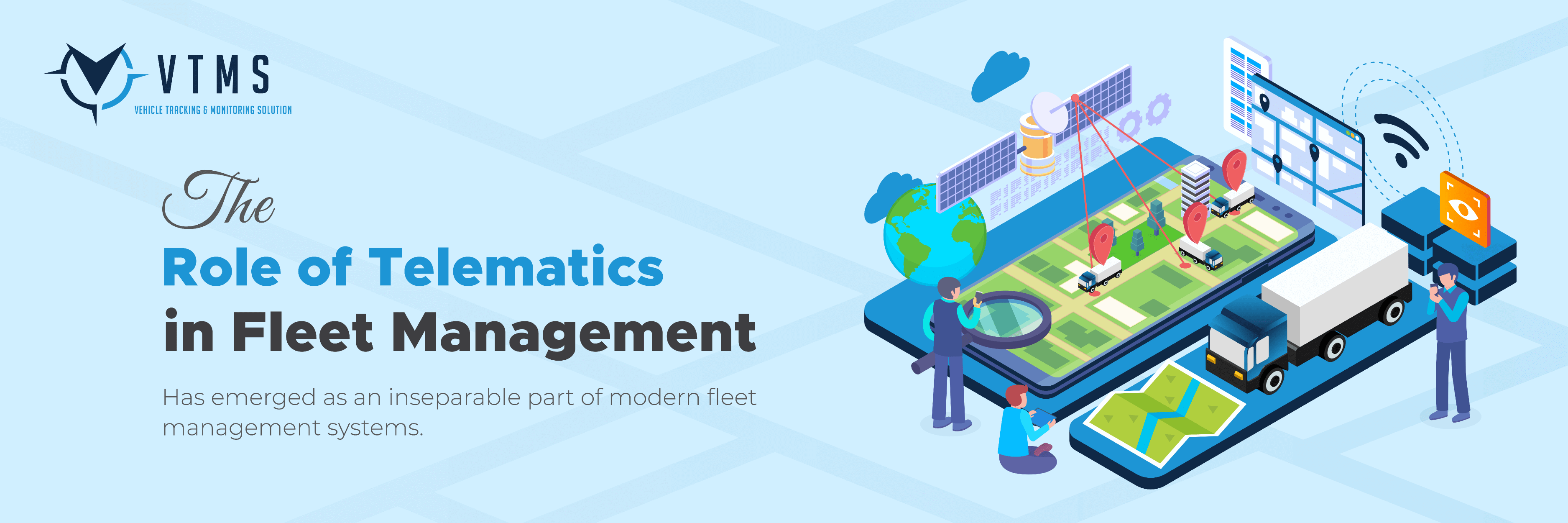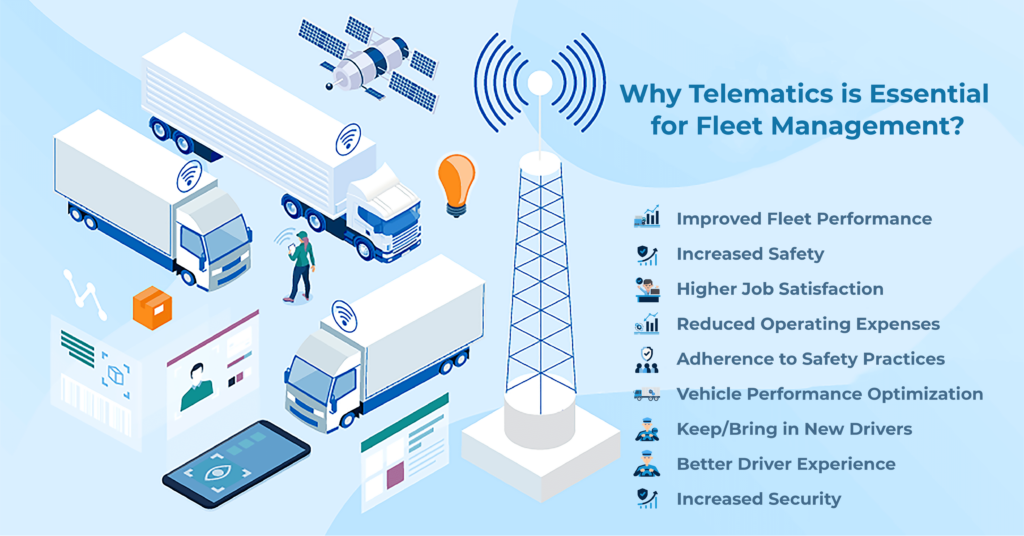The Role of Telematics in Fleet Management

Telematics has emerged as an inseparable part of modern fleet management systems. It is a technology used to monitor various vehicle sensors and track fleet locations using GPS technology. Telematics is a combination that evolved from telecommunications and information technology. It involves data collection from various sensors, its storage on a device (information technology), and then transmitting that data collection to the system over a cellular network (telecommunication). Once the data is collected on a computer, it can display everything like acceleration, braking patterns, vehicle speed, fuel levels, etc. This data received on the system is then converted into human-understandable forms like graphs, pie charts, etc. It is then used by fleet managers for concluding certain decisions and taking required actions.
Fleet managers can use telematics systems for real-time fleet monitoring and optimize their pickup and delivery schedules. This increases service speed for customers, reduces overall vehicle idle time, and helps save fuel. Maintenance schedules and mechanical repairs can integrate into telematics systems to minimize vehicle downtime and reduce instances of mechanical failure which in turn results in increased vehicle repair costs. Many such small instances of cost saving can lead to overall operational cost reduction and result in better profit margins for fleets.
Why Telematics is Essential for Fleet Management?
Telematics combines hardware and software to deliver real-time information on the state of a fleet. This is especially useful for fleet managers who are attempting to plan shipments across diverse geographic regions, maybe even crossing state or international boundaries. The quantity of fleet and vehicle data that can be gathered and evaluated is increased multifold by telematics. Here is why Telematics is important for Fleet Management:

● Improved Fleet Performance
Traffic jams and high-priority loads on the roadway can be deviated and managed by real-time communication and routing software. The general utilization of the fleet can be increased by extending each driver’s normal service hours (HOS) by merely a few minutes.
● Increased Safety
When drivers are aware that they are being watched, they behave following business and legal requirements, which can reduce accidents and damage to vehicles and cargo.
● Higher Job Satisfaction
Digital records provide drivers more control over their daily routines, which is one of the main factors that contribute to job satisfaction. Drivers are better able to cooperate with dispatchers and meet the needs of the customer since they are aware of their remaining working time.
● Reduced Operating Expenses
A fleet may save a lot of fuel by reducing idle time even by a few minutes. Improved fleet and driver utilization can increase the availability of equipment with the available resources to meet customer needs.
● Adherence to Safety Practices
The management may observe different signs of driver behavior as well as how quickly the trucks are driven when they are linked together. Drivers may receive rewards or advice depending on how well they perform in comparison to the rules and norms.
● Vehicle Performance Optimization
Automobile sensors can provide engine alarms and other hardware concerns while alerting routing stations when a vehicle is out of commission with the use of fleet telematics. The drive fleet overhaul and planning for a replacement might also benefit from the vehicle data cache.
● Keep/Bring in New Drivers
By allowing drivers to virtually attend company meetings and, with the aid of a telematics device, increase everyday connection with their executives, mobile technology can help drivers who occasionally feel detached. Route mapping and optimization help new drivers quickly take over and manage deliveries with ease,
● Better Driver Experience
Drivers can participate in cross-company gamification based on data from telematics devices to promote driving efficiency or build incentive programs for drivers who surpass their safety and effectiveness goals. They may watch movies, play games, and talk with friends and family on their off-duty phones.
● Increased Security
As GPS tracking and alerts let fleet managers keep track of vehicles at all times, this feature gets especially useful in case a truck is stolen or damaged at deserted territories. Safety Analytics helps managers identify which drivers are practicing safe driving habits, and which drivers need additional training. This enhances the safety equation of the entire fleet and leads to substantial cost savings.
And of course, what is good for the driver is good for the carrier too. Stress-free, high-performing drivers tend to stay committed to their employer, which reduces recruitment expenses and almost eliminates training costs.
Telematics is significant not just to vehicles’ health and performance, but for the well-being and efficiency of businesses too.
Conclusion
There are endless benefits of telematics applications to Fleet management and logistics/cargo delivery industries. When this technology is combined with new-age fleet management systems, we get tremendous results. They assist in making decisions that improve their operational efficiency and provide their customers with seamless service. One such efficient and telematics-equipped fleet management solution is Asti Infotech’s VTMS. It is a combination of vehicle diagnostics, GPS technology, and network communication which presents managers with a real-time picture of their fleet operations. It promises its customers exponential growth performance charts, declining operational costs, improved fleet throughput, and safer trips. Numerous such benefits can be experienced after joining hands with Asti Infotech.
For more details, log in to www.astiinfotech.com
FAQ’S
How does telematics technology benefit fleet management?
Telematics technology offers real-time monitoring of vehicles, enabling fleet managers to track locations, analyze driving behavior, and optimize schedules. This helps reduce idle time, improve fuel efficiency, and enhance overall service speed for customers.
What types of data can be collected and analyzed through telematics systems?
Telematics systems can collect various data, including vehicle speed, acceleration, braking patterns, fuel levels, and engine diagnostics. This data is then processed and presented in user-friendly formats such as graphs and charts for fleet managers to make informed decisions.
How does telematics contribute to cost savings in fleet operations?
Telematics enables efficient management of vehicle maintenance schedules and mechanical repairs, minimizing downtime and reducing instances of mechanical failure. This proactive approach helps lower repair costs, optimize fuel usage, and ultimately leads to overall operational cost reduction and improved profit margins for fleets.
Is telematics technology only suitable for large fleets, or can it benefit smaller operations as well?
Telematics technology is adaptable and scalable, making it beneficial for fleets of all sizes. Whether managing a small fleet of vehicles or a large enterprise operation, telematics systems offer valuable insights and optimization opportunities to enhance efficiency and profitability.
How secure is the data transmitted and stored by telematics systems?
Telematics systems employ robust security measures to ensure the confidentiality and integrity of data transmitted and stored. This includes encryption protocols for data transmission over cellular networks and secure storage mechanisms to protect against unauthorized access. Fleet managers can have confidence in the privacy and security of their operational data when utilizing telematics technology.
Quick Read: Why Fleet Management Solutions Are A Boon for Transport Vendors?